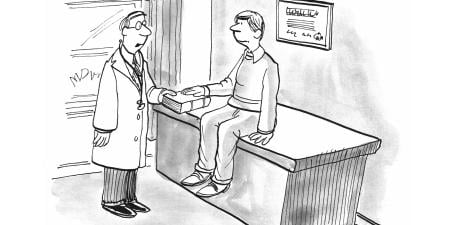Attendant: The doctor will be with you in a moment.
Elaine: [ looking at her chart ] Difficult?
Doctor: Elaine, you shouldn't be reading that. So tell me about this rash of yours.
Elaine: Well it's, it's. . . . You know I noticed that somebody wrote in my chart that I was difficult in January of '92 and I have to tell you that I remember that appointment exactly. You see this nurse asked me to put a gown on but there was a mole on my shoulder and I specifically wore a tank top so I wouldn't have to put a gown on. You know they're made of paper.
Doctor: Well that was a long time ago. How about if I just erase it. Now about that rash. . .
Elaine: But it was in pen. You fake erased.
Doctor: All right Ms. Benes. This doesn't look too serious. You'll be fine.
Elaine: What are you writing? Doctor. . . .
In this classic Seinfeld episode, Elaine Benes learns that she was once labeled a "difficult" patient because she wouldn't cooperate with a nurse and change into a paper examination gown. Subsequently, Ms. Benes encounters problems getting necessary treatment for her rash and believes it is because physicians consider her to be a whiner and malingerer. Ms. Benes resorts to stealing her medical chart in an effort to erase this label, which only adds to further chart entries and a spreading reputation of being difficult that sticks to her like the rash that plagues her.
What do we mean when we say that a patient is difficult? To some, a difficult patient is one who makes irrational choices that would be harmful to his or her own health. Others may see a patient who engages in disruptive conduct as difficult. In some circumstances, it may boil down to a clash of personalities between a patient and physician. At other times, the difficulties arise as a result of something more fundamental such as patients' beliefs and values that run counter to the physician's own. Generally, patients are considered to be difficult when their decision-making, behavior, personality, or beliefs impede the provision of good medical care.
I doubt that there is a practicing physician among us who has not dreaded seeing the name of a particular patient on his or her appointment list. This dread is shaped in part by biases that range from patient features as seemingly basic as body hygiene to those as substantial as religious convictions. In between is an entire range of personality traits—demanding, unpleasant, bigoted—that may test the patient-physician relationship.
Like agents in any other social relationship, patients and physicians will sometimes have difficulty establishing rapport—a physician simply dislikes a patient (or vice versa). Demanding and complaining patients challenge physicians' ability to respond compassionately and to ignore the behaviors that they find offensive. In such situations, it is critical for the physician to determine that the annoying behaviors chalked up to "personality" are not actually reflecting unmet patient needs. If the behavior is related to need, the physician has a professional obligation to deal with that need without discriminating against the patient. Hateful and bigoted patients, on the other hand, severely test a physician's objectivity and sense of justice. In these situations, there are no easy remedies, particularly in a medical emergency or when patients' access to other sources of care is limited or non-existent.
The characterization that good care cannot be properly dispensed because of difficulties arising solely from patients' beliefs and behavior fails to capture the relational complexity of interactions among patient, physician, and context just discussed. As physicians, we recognize that difficulties in the clinical encounter come with the territory, and that some challenging situations are never going to be adequately resolved. At the same time, I firmly believe that the desire to help people, even those they may disagree with or dislike, continues to motivate individuals who choose to pursue medicine as a career. In this spirit of realistic idealism, this theme issue of the Virtual Mentor explores the ramifications and remedies of the difficult patient-physician relationship. It is our hope and expectation that the featured stories, analyses, and subsequent online discussions will provide our readers with insight and information on how to better deal with the difficult situations that invariably arise when patients and physicians interact.



